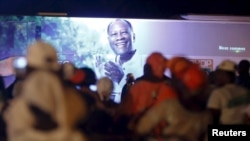The newly re-elected president of Ivory Coast, Alassane Ouattara, says he hopes to promote national reconciliation and cut poverty in half during his second term.
President Ouattara spoke Thursday with VOA's French-to-Africa Service in Abidjan, a day after he was declared the winner of the October 25 election with 83 percent of the vote.
His main challenger, Pascal Affi N'Guessan, conceded defeat, but said Ivory Coast remains divided from 2010, when an election dispute triggered violence that killed 3,000 people, and urged Ouattara to tackle that issue during his new term.
During the interview, the president said that is what he intends to do.
"After what we experienced, to have this election, which was very peaceful ... this shows that reconciliation is making progress, but we have to do more, because it's important for the country, for the next generation," he said. "And I will continue to do my best to reconcile my compatriots."
Asked if he had a message to those who didn't vote for him, Ouattara said he is the president of all Ivorians, without exception and without discrimination.
A small US?
During the past three years, Ivory Coast, the world's biggest cocoa producer, has experienced economic growth of nine percent per year. Ouattara said he plans to continue trying to develop the country during his second term.
"We will continue to give emphasis on the private sector, because I am a liberal, I believe in liberal policies," he said. "Secondly, we want to get more efficiency in the public sector, public investment."
He said this will help reduce poverty. "We were above 50 percent [when I took office]; we've reduced it by 10 percent," he said. "My objective is to reduce it by half for my next term, by 2020."
The president said he looks on the United States as a model, economically.
"I want a new Ivorian who is working hard, being disciplined, being together and be open to others," he said. "Those are the main ingredients of success of a country like the United States, where I studied and where I lived for a long time. I want Cote d'Ivoire to be a small America."
'Happy' leader
Ouattara, 73, said he is a happy man, in part because the election was peaceful and because the results show the people trust him. "The results of the election are exceptional," he said. "They show a great trust from the people in what we are trying to achieve in our policies, in our action."
He said to achieve true national reconciliation, Ivorians will have to forgive each other for the 2010 violence, adding that his government must bring to justice the perpetrators of that violence.
Former president Laurent Gbagbo, whose refusal to concede defeat in the 2010 vote triggered the unrest, is now facing trial at the International Criminal Court. Gbagbo supporters have said some of Ouattara's backers should be prosecuted as well.
Ouattara indirectly acknowledged the claims during the interview. "Justice must be equal for all, we need to avoid impunity, and that is what we are doing, but it takes time," he said.
Ivory Coast's constitutional court has one week to affirm the election results. After that, Ouattara can be sworn in for his second five-year term.
During the campaign, Ouattara said he would respect the two-term limit in the Ivorian constitution, saying "my mandate ends in 2020."
At this point, it seems the Ivorian president has no plans to seek a third term, the issue that has sparked controversy and protests in other African countries, and brought down Burkina Faso's longtime president Blaise Compaore one year ago.
Ouattara called the recent coup attempt in Burkina Faso unfortunate, but expressed optimism as Ivory Coast's neighbor prepares to hold elections next month.











